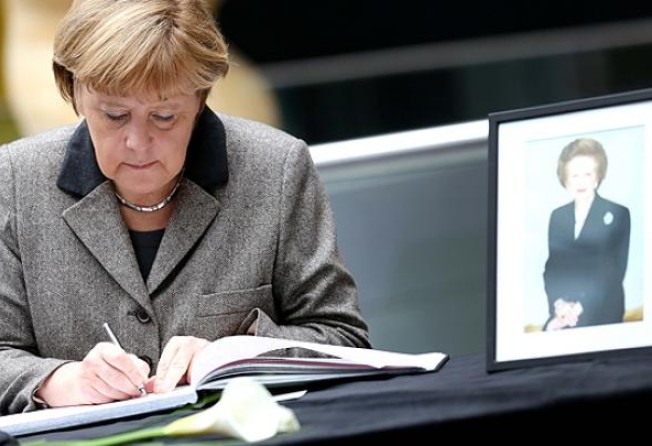Thatcher never lost her political sparkle, say trusted friends
Even as the end neared for the former British prime minister, she was still capable of an incisive and clever response, say trusted friends

Among the last things Margaret Thatcher saw in the final hours before her death was a video of eight biscuit-coloured dachshund puppies and their mother.
The dogs belonged to Carla Bonardi, the Italian wife of the former prime minister's trusted Downing Street private secretary, Charles Powell.
On Sunday night, Powell was the last person to visit Thatcher as she neared the end of a 20-year battle with strokes, memory loss and the rheumatic condition polymyalgia.
Sitting with her at her suite in the Ritz hotel in London, where she had been staying since the end of last year, Powell took out his iPad to entertain her.
On it, he showed her a video his wife had sent him from their home near Rome which Thatcher had visited during her decline.
She had smiled at the antics of the puppies and their mother, said Powell's wife. "That was probably her last smile," she said. "After seeing her, Charles' comment was, 'I'm afraid that she will not be with us for very long. I think she's drifting away.'"
Powell, who was made a life peer in 2000, was part of a small circle of trusted friends who attended to the former prime minister in the last months of her life at the hotel.
She moved there at the invitation of Telegraph Media Group owners David and Frederick Barclay following an operation to remove a growth on her bladder before Christmas which had left her struggling to use the stairs of her house in Belgravia.
Powell went to see her nearly every week when in London. They would sing hymns and he would read to her, often from the biographies of other prime ministers. He would joke with her that the political world was waiting for her return. "He'd say, 'You see? They're waiting for us.' And she'd reply, 'Yes. We must go back'." Although illness had already largely robbed Thatcher of her famously sharp mental faculties, such flashes of her old drive were common in the final stretch of her life, friends said.
Before the end neared, at a joint lunch for her and former Australian prime minister John Howard, Michael Forsyth, the former Scottish secretary made a life peer in 1999, opened proceedings by saying what a privilege it was to host two former leaders who were social Conservatives.
Thatcher interrupted Forsyth to say: "What is this word social? We are good Conservatives."
Forsyth said: "Even when she appeared to be having a difficult day she was capable of coming back with a very incisive and clever response which, in this case, brought the house down."
Even when she appeared to be having a difficult day she was capable of coming back with a very incisive and clever response
The scene in the Ritz was the culmination of two decades of mental and physical decline.
Her biographer Robin Harris said that Thatcher's mental state first really seemed to falter in 1993, with deafness creeping in three years later.
In 2001, on holiday in Madeira, Harris said in an extract from his book Not For Turning: The Life of Margaret Thatcher, she suffered the symptoms of a stroke. When she returned to Britain, tests confirmed that several strokes had done irrevocable damage to her mental faculties.
In 2003, her husband Denis died after a heart bypass operation and a diagnosis of terminal pancreatic cancer, and she was devastated with grief.
But Gerald Howarth, the former defence minister who served as Thatcher's aide after her resignation as prime minister, thought she showed extraordinary strength in her last years.
"You think of what she put herself through - up all night working - and yet she kept going until the age of 87.
"In her last years she lost none of her political sparkle. But it did become increasingly difficult for her physically."